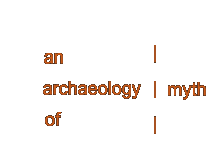
Web Resources
 |
Web Resources |
|
Assuming that your instruction in mythology has been minimal, you might begin by reading Joseph Campbell's work. Joseph Campbell, who died only a few years ago, was one of our most celebrated and well-known contemporary mythologers. He was a spell-binding speaker, and a man so thoroughly familiar with world mythology, that one had the sense that mythology, like muscle tissue or blood, was part of his very being. Campbell was a thoroughly charming man and I remember fondly his public presentations attending his workshops. For those unwilling to proceed without a definition, here is one web-author's efforts to define myth that relates the elements of the definition to various myth scholars: "Myths are stories, usually, about gods and other supernatural beings (Frye). They are often stories of origins, how the world and everything in it came to be in illo tempore (Eliade). They are usually strongly structured and their meaning is only discerned by linguistic analysis (Lévi-Strauss). Sometimes they are public dreams which, like private dreams, emerge from the unconscious mind (Freud). Indeed, they often reveal the archetypes of the collective unconscious (Jung). They are symbolic and metaphorical (Cassirer). They orient people to the metaphysical dimension, explain the origins and nature of the cosmos, validate social issues, and, on the psychological plane, address themselves to the innermost depths of the psyche (Campbell). Some of them are explanatory, being prescientific attempts to interpret the natural world (Frazer). As such, they are usually functional and are the science of primitive peoples (Malinowski). Often, they are enacted in rituals (Hooke). Religious myths are sacred histories (Eliade), and distinguished from the profane (Durkheim). But, being semiotic expressions (Saussure), they are a "disease of language" (Müller). They are both individual and social in scope, but they are first and foremost stories (Kirk)." From: Myth and Legend from Ancient Times to the Space Age (Philip R. Burns)(an inactive web-site). Introduction Classical Greek Mythology
Goddess, Women, & Mythology
Fairy Tales Fables World Mythology
Myth & Film
Myth & Theory
Background Resources |